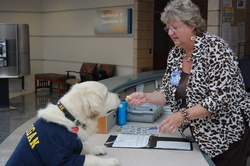Pet therapy is an integral part of healing, even in mental health

Madam always wears an outfit when working. Here she is in her Valentine's Day best.
Photo courtesy of Lois Brassow
Although Madam is small for her breed at 103 pounds, she makes a visual impact, as she's usually dressed in a cute dog outfit. The pair are always greeted warmly upon their arrival, and to say the least, they are the center of attention.
Madam's presence, especially, provides a welcome distraction from the day-to-day life for the people she gets to engage with; they talk to her, pet her and play games. She's an outlet, a source of joy and a tangible tether to life that exists outside of the four walls that the visits are conducted in.
In the past, you've probably heard of Pet Therapy teams who visit nursing care facilities, pediatric units, schools and the like. One area that you might not expect to see a therapy team in, is a mental health unit: And yet this is where Lois and Madam, along with a handful of other locally-based Therapy Dog teams, spend a couple of hours a month.
Brassow and Madam have been visiting the Center for Forensic Psychiatry in Saline for a while, now, and Brassow notes that it's not only fun for the patients at the facility, but especially for Madam.
"It's her job, and she loves it!"

Dexter, enjoying a swim.
Photo courtesy of Shari Castor
Shari Castor, owner of Golden Rule Pet Sitters in Milan, has also been bringing therapy dogs to the center for years. When she started, her "other half" at the time — Dexter, a golden retriever — was a welcome sight for the patients.
In fact, one of the patients would frequently interact one-on-one and formed quite a positive bond with the dog. Sadly, Dexter passed away unexpectedly last summer, and when another Therapy Dog team showed up in their place for that week, the patient was terribly disappointed and just withdrew from the activities that day, Castor said.
When Castor showed up the next time, she had to explain to the patient why Dexter wasn't there with her — which proved difficult to do, because she had long before realized the bond that was shared by both.
"Everyone who participated in the program took it especially hard," Castor said.
Now, Castor is accompanied by one of her clients — a golden retriever named Hamlet — who Castor says is beloved by everyone at the facility.
The connection that the patients feel with the dogs is evident in so many ways. Both Brassow and Castor say the people that they visit frequently talk about pets that they've had in their lives, the lasting experiences that they carry with them. Surprisingly, they patients even love hearing about the mundane day-to-day activities that make up the lives of their four-legged visitors.
After all, for many of these patients, it's something that they have in common with another human being - pet ownership - a positive experience that is devoid of stigmatization. Pets extend a connection to human beings that is honest, non-judgmental and free from negativity.
Another team includes 4-year-old Robyn, an English Golden Retriever, and his partner, Karen Eisenbrey.
Eisenbrey first got started in the realm of pet therapy after doing work at at an area children's center in 2004, where in some cases the children had been victims of sexual abuse. Her dog, Danny, would accompany her to the facility, and it was there that she saw the therapeutic effects of having a dog present in a crisis situation: the victims were more relaxed and would communicate better when the pooch was around. Plus, Danny loved it. He was a calm dog who loved people, and from the beginning, it was a natural fit for him to be registered as a therapy dog.

Robyn, getting his "paycheck" from Diane DiNio, Director of Activity Services at CFP.
Photo courtesy of Karen Eisenbrey
Later, Eisenbrey, who practices law, also saw the benefits of therapy dogs at the W.J. Maxey Boys Training School and the Huron Valley Center.
In 2005, Diane DeNio, director of activity services for the Center for Forensic Psychiatry, extended an invitation to Eisenbrey, as she saw the value of implementing a program that employed the use of pet therapy.
The program has been beneficial for the patients, as well as the dogs: Brassow, Castor and Eisenbrey all note that their dogs are satisfyingly tired when they get home.
The facility's staff also look forward to the visits.
Visits take place for about an hour, once a week, with one team present at a time. Patients interact, play games, and even teach the dogs tricks. Most importantly, the patients talk.
"The dogs have a way of breaking down barriers," Eisenbrey said.
When asked what she wants readers to take away from reading this, Eisenbrey said, "I urge people to open up to pets, and their capacity to bond," adding that despite the fact that animals lack the capacity to speak, they are able to help others achieve profound things.
The most important of which, very likely, is to be accepted as a human being.
All of the participants are registered through Therapy Dogs, Inc., and those interested in getting involved as a pet therapy team working with psychiatric patients can get more information by clicking here. Other areas of psychiatric care — inpatient, outpatient and dementia units — have expressed interest in employing pet therapy in Washtenaw County.
Lorrie Shaw is lead pets blogger for AnnArbor.com and has previously expanded on the therapeutic effects of animals. You can contact her via e-mail and follow her daily adventures on Twitter as a professional dog walker and pet sitter.


Comments
Holy Cow
Wed, Feb 23, 2011 : 10:43 p.m.
I really enjoyed the story. I think it is a welcome contrast to all of the "hard core" news that is usually about murder, riots, unemployment etc.
FattyJ
Fri, Feb 18, 2011 : 6:23 p.m.
This is some really hard-hitting journalism.
julieswhimsies
Fri, Feb 18, 2011 : 5:34 p.m.
Never underestimate the power of an animal to heal. I have been on both sides of this picture. I know.